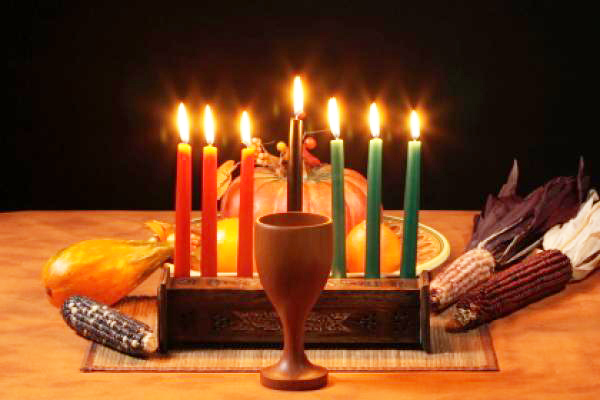The UBAD Educational Foundation will be holding its 2013 Kwanzaa Celebration at 5:00 p.m. on January 1, 2014, at the Library of African and Indian Studies on the Kremandala compound at 3304 Partridge Street. Iyanifa Omitade Adediran will be the guest speaker.
Kwanzaa is celebrated from December 26 to January 1 annually. It was founded in 1966 by Dr. Maulana Karenga, Professor and Chair of Africana Studies, California State University-Long Beach; Executive Director, African American Cultural Center (Us); and author of Kwanzaa: A Celebration of Family, Community and Culture and Introduction to Black Studies, 4th Edition.
This year’s Kwanzaa theme is “Celebrating and Living Kwanzaa: Sowing and Harvesting Seeds of Good”.
Karenga said, in his address published last week by Los Angeles Sentinel, that “…the sowing of seeds of good, of necessity, turn here to principled practice, i.e., the practice of the Seven Principles, the Nguzo Saba, which are the cultural hub and hinge on which the holiday turns. Indeed, it is these principles practiced throughout the year that ensure that Kwanzaa is not only a season of celebration, but also a living and lived tradition.”
Karenga said that to practice the Seven Principles is to sow and harvest seeds of good.
“For each good deed done is a seed of good sown. And in its time, as the ancestors taught us, it will grow and bear fruit. Thus, each seed of good sown, promises and produces a good we each and all can together harvest and share. Again, as our ancestors taught, every good deed done also aids in building the good family, community and world we all want and deserve to live in. This is the meaning of the teaching of the Husia that says, ‘Do good. Doing good is not difficult. Just speaking good is a monument for those who do it. And those who do good for others are also doing it for themselves.’ For they are building and shaping the good and beautiful world we all want and deserve.”
The 7 Principles of Kwanzaa
Karenga addresses the 7 principles of Kwanzaa in his 2013 speech:
“To practice the Seven Principles is also to engage in personal and social practices and struggles to transform ourselves and the world which are informed and inspired by these principles. The principle of Umoja (Unity) teaches us the oneness of life, the kinship and common interests of our people, the interrelatedness and interdependence of humanity and our active solidarity with the suffering, oppressed and struggling peoples of the world.
“The principle of Kujichagulia (Self-Determination) teaches us to uphold our right and responsibility to be ourselves, to live free lives, to enjoy a full measure of justice, and to bear constant witness to the equal validity and value of African ways of being human in the world without denying other people similar rightful claims.
“The principle of Ujima (Collective Work and Responsibility) teaches us a shared responsibility in building the good families, societies and world we want and deserve to live in, to be actively concerned and engaged with the well-being of the world, to relentlessly resist evil and injustice, and to constantly seek common ground and common good. The principle of Ujamaa (Cooperative Economics) teaches us to practice the ethics of shared work and shared wealth; to uphold the right of the peoples of the world to a just and equitable share of the goods of the world; and to struggle to establish policies and practices which aid and empower the poor and vulnerable, protect and preserve the environment and create conditions conducive to a life of dignity and decency for everyone.
“The principle of Nia (Purpose) teaches us to remember the sacred collective vocation given to us in the Odu Ifa which says ‘humans are divinely chosen to bring good in the world’ and that this is the fundamental mission and meaning of human life. And it teaches us to be constantly aware that this requires service, work, sacrifice and struggle, both in the interest of our people and for the good of the world.
“The principle of Kuumba (Creativity) teaches us the ancient African ethical imperative of serudj ta—the moral obligation to constantly heal, repair and remake the world, making it more beautiful and beneficial than we inherited it. It is again the instruction to raise up what is ruined; repair what is damaged; rejoin what is severed; replenish what is depleted; strengthen what is weakened; set right what is wrong; and make flourish that which is insecure and undeveloped.
“Finally, the principle of Imani (Faith) teaches us to believe in the good, to raise it up, praise it and pursue it everywhere. It teaches us to believe in our capacity, commitment and struggle, as a people, to be good, do good and sustain good in the world. And it teaches us a faith founded in the history, hope and hard struggles of our people; a faith that dares to believe that through hard work, long struggle and a whole lot of love and understanding, we can actually be ourselves and free ourselves and with other progressive and struggling peoples bring into being a new hope, history and world for humankind.”

